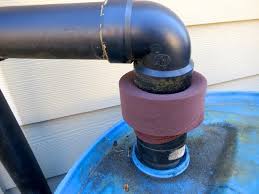The Importance of Rainwater Filters for Sustainable Water Management
Rainwater harvesting is a valuable practice that allows us to collect and store rainwater for various uses, such as irrigation, household chores, and even drinking water in some cases. However, before utilizing rainwater, it is essential to filter it properly to ensure its quality and safety.
Rainwater filters play a crucial role in removing contaminants, debris, and pollutants that may be present in collected rainwater. These filters help improve the water quality by trapping sediments, leaves, insects, and other particles that can affect the taste and cleanliness of the water.
By incorporating rainwater filters into your harvesting system, you can prevent clogging of pipes and tanks, reduce maintenance requirements, and prolong the lifespan of your water storage infrastructure. Additionally, filtered rainwater is more suitable for use in gardens, toilets, laundry machines, and other non-potable applications.
There are various types of rainwater filters available on the market, including mesh filters, cartridge filters, UV filters, and carbon filters. Each type serves a specific purpose in removing different types of impurities from the collected rainwater.
Investing in a high-quality rainwater filter is essential for ensuring the safety and reliability of your harvested rainwater. Regular maintenance and cleaning of the filter are also necessary to maintain its effectiveness over time.
In conclusion, incorporating a rainwater filter into your harvesting system is a sustainable way to manage water resources efficiently while promoting eco-friendly practices. By filtering rainwater before use, you can enjoy clean and safe water for various purposes while reducing your reliance on traditional water sources.
Essential FAQs: Filtering and Purifying Rainwater for Safe Use and Consumption
- What kind of filter do you need for rainwater?
- How do you filter rainwater for showering?
- Can you filter rain water to drink?
- How do you purify rainwater in the wild?
What kind of filter do you need for rainwater?
When considering what kind of filter is needed for rainwater, it is important to choose a filter that effectively removes contaminants and impurities from collected rainwater. The type of filter required may vary based on the specific quality of the rainwater and its intended use. Commonly used filters for rainwater harvesting include mesh filters, cartridge filters, UV filters, and carbon filters. Mesh filters are ideal for trapping larger debris such as leaves and insects, while cartridge filters can remove finer particles and sediments. UV filters help disinfect the water by eliminating harmful microorganisms, and carbon filters can improve taste and odor by absorbing chemicals and organic compounds. Selecting the right filter for your rainwater system is crucial to ensure clean, safe, and high-quality water for various applications.
How do you filter rainwater for showering?
Filtering rainwater for showering involves using a combination of filtration methods to ensure that the water is safe and clean for use. The first step is typically to install a pre-tank filter to remove larger debris and contaminants before the water enters the storage tank. From there, a series of filters, such as sediment filters, carbon filters, and UV filters, can be used to further purify the rainwater. These filters help remove impurities, bacteria, and odors, ensuring that the water is suitable for showering. Regular maintenance and replacement of filters are essential to maintain the effectiveness of the filtration system and ensure that you have access to clean and refreshing rainwater for your showers.
Can you filter rain water to drink?
Filtering rainwater for drinking purposes is a common query among individuals exploring sustainable water management practices. While rainwater is generally considered safe and clean, it may still contain contaminants and impurities that need to be filtered out before consumption. With the right filtration system in place, including advanced filters like UV or carbon filters, it is possible to effectively remove any potential pollutants from collected rainwater, making it suitable for drinking. However, it is crucial to ensure that the filtration system is properly maintained and regularly checked to guarantee the quality and safety of the filtered rainwater for drinking purposes.
How do you purify rainwater in the wild?
When purifying rainwater in the wild, there are several methods you can use to ensure its safety for consumption. One common approach is to boil the collected rainwater over a fire to kill any harmful bacteria and pathogens. Another method is to use portable water filtration devices or purification tablets to remove impurities and make the water safe to drink. Additionally, constructing a simple sand and charcoal filter can help remove sediments and improve the water’s clarity. It is essential to be cautious when consuming untreated water in the wild and always prioritize safety by using reliable purification methods to prevent waterborne illnesses.

